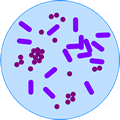Practice Vocabulary for Health, Illness, and Types of Germs
This page lets you practice vocabulary related to types of germs, health, and illness. “Germs” are micro-organisms that can make people sick. ‘Germ’ is the common term, because it’s shorter, but it would almost never be used in scientific or medical writing.
There are many different kinds of germs, causing or contributing to quite a number of diseases. There are also many harmless or beneficial micro-organisms, like the intestinal bacteria that help us digest food.
If you would prefer to complete the lists and do the matching on this page on a printable pdf rather than online and in your head, click here for a pdf (this page & answers.)
Words related to Sickness and Health
 Germs (bacteria)
Germs (bacteria)Put these health and illness-related words (including types of germs) into the lists below (in your head or on a piece of paper):
amoeba, antibiotics, bacteria, communicable, contagious, disease, fungi, hygiene,* health, illness, immunization, infection, infectious, medicines, molds, natural remedies (like herbs), sickness, vaccination, viruses
(*Hygiene is sanitary measures like hand-washing and disinfection of surgical tools that help preserve health)
Lists:
1. Words meaning illness
2. Adjectives describing an illness that can easily spread (be passed) from one person to another
3. Names for different types of micro-organisms (tiny creatures) that can cause disease (germs)
4. Ways to prevent and treat disease (including medical treatments)
Match these sentence beginnings and endings
Note: The verb forms and endings can give you clues. Be sure the verbs agree with their subjects-- the nouns that tell who or what is causing the action. Also check if the sentences make sense.
(Several of the sentences do not relate directly to germs, but practice other meanings of 'compound' and 'exposure,' words that are often used to discuss how illnesses spread or are treated.)
List Answers and Explanations
Words meaning illness
disease, illness, infection, sickness. (Sometimes we speak casually about “catching a bug.” That usually does not mean taking an insect into our hands but becoming sick through contact with someone else who was sick (being infected by a germ).
Adjectives describing an illness that can easily spread (be passed) from one person to another
communicable, contagious, infectious (We also sometimes informally use ‘catchy’ from ‘to catch a cold.’ Someone might tell a co-worker who fears getting sick: “I’m sneezing and I don’t feel good, but it’s an allergy. It isn’t catchy.”)
Names for different types of micro-organisms (tiny creatures) that can cause disease (germs)
amoeba, bacteria, fungi, molds, viruses. (The word ‘mold’ can mean a tiny plant that can cause illness or allergies or damage to a building. Another meaning of ‘mold’ is a form that can be used to shape cement or certain foods like gelatin. The verb ‘to mold’ means to shape something.)
Also note these adjectives: amoebic, bacterial, fungal, viral.
Ways to prevent and treat disease (including medical treatments)
antibiotics (medicines that kill bacteria and certain other micro-organisms, but not viruses), hygiene, immunization, medicines, natural remedies like herbs, vaccination
Home> Online Vocabulary Games in English >Vocabulary for Health, Illness, and Types of Germs.
Didn't find what you
needed? Explain what you want in the search box below.
(For example, cognates, past tense practice, or 'get along with.') Click to see the related pages on EnglishHints.
| site search by freefind | advanced |





